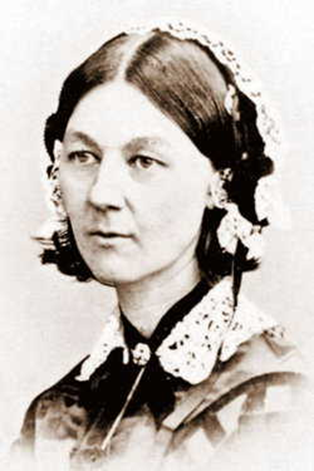Heroes and Rebels in the Family Tree—Florence Nightingale
Genealogy: Florence Nightingale (1820-1910) was the daughter of William Edward Shore Nightingale (1794-1874). [William Edward Shore was the inheritor of his great uncle Peter Nightingale who was without heir. Peter was the brother of Ann Nightingale. A stipulation of the will was that William must assume the Nightingale name.] His mother was Mary Evans (1760-1853) and her mother was Ann Nightingale (1733-1815), [brother of Peter Nightingale, previously mentioned] and her father was Peter Nightingale (1705-1763) and his brother was Thomas Nightingale (1709-1758). Thomas’ son was Richard Nightingale (1735-1816) and his son was Richard Nightingale (1771-1825) and his son was Cornelius Nightingale (1796-1872) and his daughter was Mary Nightingale (1816-1889). Mary Nightingale married Charles Daykin and their son was Charles Daykin (1849-1905). His son was Charles Daykin (1899-1973) and his son was Melvin Daykin (1846-2021) and his daughter was Angela Marie Daykin (1966- ) whose daughter is Samantha Bush and her father is John Bush and his mother was Olive Joyce Adams (1926-2018) who was the daughter of Francis Henry Adams (1884-1965) and his father was William Frederick Adams (1848-1907) and his son was George “Pikey” William Welch-Adams (1867-1940).
The following information was extracted from the Reynolds-Finley Library Florence Nightingale
Collection at the University of Alabama in Birmingham, Alabama, USA.
The period between the later half of the 17th century and
the middle of the 19th has been described by medical historian Fielding
Garrison as the “dark age” of nursing. Nurses in those days were typically
poor, unskilled and often associated with immoral behavior. The hospitals they
served held equally low reputations as unclean, disorderly, and infection
breeding. They were often regarded merely as places to die. So it is not
difficult to see why Florence Nightingale’s family, wealthy and respectable as
they were, discouraged her from selecting this “unsuitable”
profession. But Florence went against her parent’s wishes, refused a
prospective marriage and in 1851 trained as a nurse in Kaiserswerth, Germany at
Pastor Theodore Fliedner’s hospital and school for Lutheran deaconesses.
Fliedner’s school was one of the earliest institutions for the proper training
of nurses outside of the Catholic religious orders. In 1853 Nightingale went
for additional training in Paris with the Sisters of Mercy. After her return to
England, Florence took a position as superintendent for London’s Establishment
of Gentlewomen during Illness in 1853.
Nursing during the Crimean
War
Responding to unpopular newspaper reports of the horrendous
situation in the English war camp hospitals, Secretary of War Sidney Herbert, a
personal friend of Nightingale, consented to let her organize and manage a
group of female nurses to go to Turkey. On November 4, 1854, Nightingale and 38
nurses arrived in Scutari, the location of the British camp outside
Constantinople. The doctors originally did not welcome the incoming female
nurses, but as the number of patients escalated, their help was needed in the
overcrowded, undersupplied, and unsanitary hospital. Under Florence’s
leadership, the nurses brought cleanliness, sanitation, nutritious food and
comfort to the patients. Nightingale was known for providing the kind of
personal care, like writing letters home for soldiers, that comforted them and
improved their psychological health. Her group of nurses transformed the
hospital into a healthy environment within six months, and as a result, the
death rate of patients fell from 40 to 2 percent. In 1857, Florence returned
home a heroine. It was the soldiers in Crimea that initially named her the
"Lady with the Lamp" because of the reassuring sight of her carrying
around a lamp to check on the sick and wounded during the night, and the title
remained with her.
Upon her return from the Crimean War, she devoted the next
few years to the Royal Commission investigating health in the British Army. It
was her discussions with Queen Victoria on the conditions of the camp hospitals
that sparked the commission’s formation. Also, Nightingale's statistical data
and analysis strongly influenced the commission's findings, which resulted in
great public health advances in the British army.
Professional Nursing
Pioneer
In 1859, Florence Nightingale’s book Notes on
Nursing: What it is, and What it is Not was published. Based on
knowledge acquired at school in Kaiserswerth and while nursing the sick during
the Crimean War, Notes on Nursing provides a simple but
practical discussion of good patient care, along with helpful hints. According
to Florence Nightingale, hygiene, sanitation, fresh air, proper lighting, a
good diet, warmth, quietness and attentiveness were necessary conditions for
hospitals and were to be ensured by trained nurses. Taken for granted today,
her commonsense advice helped transform hospitals from death houses to
sanctuaries of care. This work quickly became a classic introduction to
nursing, and has remained in publication to the present day.
During the war a public subscription fund was set up for
Florence Nightingale to continue her education of nurses in England, and the
Nightingale Training School at St. Thomas’ Hospital opened in 1860. The
education of recruits involved a year of practical instruction in the wards,
supplemented with courses of lecturing, and followed by two years of work
experience in the hospital. After graduation, many of the students staffed
British hospitals, and others spread the Nightingale education system to other
countries.
Through her work and her school, Florence Nightingale is
responsible for elevating the profession of nursing to an honorable status. She
also wrote about 200 books, pamphlets and reports on hospital, sanitation, and
other health-related issues, as well as contributing to the field of statistics.
Throughout her life she provided advice on a variety of health care issues to
associates all over the globe. Though ill and bedridden for much of her later
life, Nightingale managed to continue her great work through correspondence.
Florence Nightingale devoted her entire life to her
profession and never married and has no direct descendants.




Comments
Post a Comment